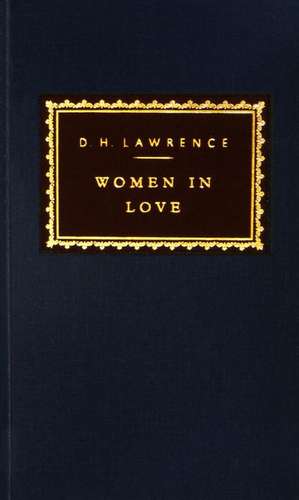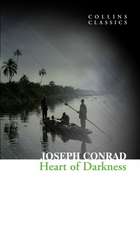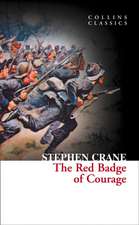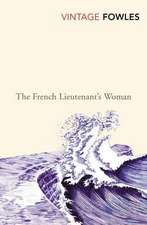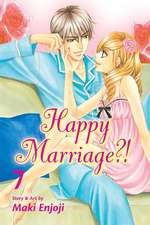Women in Love: Everyman's Library Classics & Contemporary Classics, cartea
Autor D. H. Lawrence David Ellisen Limba Engleză Hardback – 31 mai 1992
In this astonishing novel, widely considered to be D.H. Lawrence's best work, he explores what it means to be human in an age of conflict and confusion. It was written during World War I, and while that conflict is never mentioned in the novel, a sense of background danger, of lurking catastrophe, continually informs its drama of two couples dynamically engaged in a struggle with themselves, with each other, and with life's intractable limitations.
Lawrence was a powerful, prophetic writer, but in addition he brought such delicacy to his treatment of the human and natural worlds that E. M. Forster's claim that he was the greatest imaginative novelist of our generation does him too little justice rather than too much.
(Book Jacket Status: Not Jacketed)
| Toate formatele și edițiile | Preț | Express |
|---|---|---|
| Paperback (31) | 27.71 lei 22-36 zile | +12.15 lei 6-12 zile |
| Wordsworth Editions – 30 apr 1992 | 27.71 lei 22-36 zile | +12.15 lei 6-12 zile |
| Alma Books COMMIS – 21 iun 2023 | 53.11 lei 22-36 zile | +15.63 lei 6-12 zile |
| Random House UK – 4 iun 2008 | 55.63 lei 25-31 zile | +23.22 lei 6-12 zile |
| Oxford University Press – 11 sep 2008 | 56.54 lei 10-16 zile | +24.73 lei 6-12 zile |
| Penguin Books – 28 mar 2007 | 57.06 lei 25-31 zile | +25.63 lei 6-12 zile |
| CreateSpace Independent Publishing Platform – | 74.35 lei 22-36 zile | |
| CreateSpace Independent Publishing Platform – | 79.80 lei 22-36 zile | |
| CreateSpace Independent Publishing Platform – | 103.82 lei 22-36 zile | |
| EMPIRE BOOKS – 30 noi 2011 | 117.82 lei 22-36 zile | |
| KUPERARD (BRAVO LTD) – 31 dec 1999 | 117.94 lei 22-36 zile | |
| Mint Editions – sep 2021 | 125.16 lei 22-36 zile | +76.02 lei 6-12 zile |
| CREATESPACE – | 129.37 lei 22-36 zile | |
| CreateSpace Independent Publishing Platform – | 133.78 lei 22-36 zile | |
| Spastic Cat Press – 31 dec 2011 | 135.00 lei 22-36 zile | |
| CREATESPACE – | 175.99 lei 22-36 zile | |
| Alan Rodgers' Books – 29 feb 2004 | 176.72 lei 22-36 zile | |
| CREATESPACE – | 193.14 lei 22-36 zile | |
| – | 206.68 lei 22-36 zile | |
| – | 214.76 lei 22-36 zile | |
| Touchladybirdlucky Studios – 2024 | 312.97 lei 22-36 zile | |
| CREATESPACE – | 106.03 lei 43-57 zile | |
| Digireads.com – 14 iun 2019 | 124.05 lei 43-57 zile | |
| – | 126.72 lei 43-57 zile | |
| Echo Library – 18 dec 2006 | 159.17 lei 38-44 zile | |
| Read & Co. Classics – 8 sep 2020 | 159.17 lei 43-57 zile | |
| SC Active Business Development SRL – 29 noi 2017 | 172.00 lei 38-44 zile | |
| Start Classics – 26 mar 2024 | 190.51 lei 38-44 zile | |
| RUPA – 30 sep 2000 | 204.06 lei 43-57 zile | |
| Delhi Open Books – 22 mai 2020 | 232.39 lei 43-57 zile | |
| Echo Library – 31 oct 2006 | 261.28 lei 38-44 zile | |
| Cambridge University Press – 20 mai 1987 | 335.19 lei 43-57 zile | |
| Hardback (3) | 75.81 lei 25-31 zile | |
| EVERYMAN – 3 iun 1992 | 75.81 lei 25-31 zile | |
| Start Classics – 26 mar 2024 | 309.79 lei 38-44 zile | |
| Cambridge University Press – 20 mai 1987 | 1019.89 lei 43-57 zile |
Din seria Everyman's Library Classics & Contemporary Classics
-
 Preț: 239.56 lei
Preț: 239.56 lei -
 Preț: 181.46 lei
Preț: 181.46 lei -
 Preț: 155.68 lei
Preț: 155.68 lei -
 Preț: 152.82 lei
Preț: 152.82 lei -
 Preț: 291.22 lei
Preț: 291.22 lei -
 Preț: 156.56 lei
Preț: 156.56 lei -
 Preț: 140.00 lei
Preț: 140.00 lei -
 Preț: 155.68 lei
Preț: 155.68 lei -
 Preț: 176.42 lei
Preț: 176.42 lei -
 Preț: 141.92 lei
Preț: 141.92 lei -
 Preț: 154.68 lei
Preț: 154.68 lei -
 Preț: 187.87 lei
Preț: 187.87 lei - 8%
 Preț: 562.39 lei
Preț: 562.39 lei -
 Preț: 169.01 lei
Preț: 169.01 lei -
 Preț: 253.70 lei
Preț: 253.70 lei -
 Preț: 129.73 lei
Preț: 129.73 lei -
 Preț: 159.81 lei
Preț: 159.81 lei -
 Preț: 132.00 lei
Preț: 132.00 lei -
 Preț: 194.89 lei
Preț: 194.89 lei -
 Preț: 253.60 lei
Preț: 253.60 lei -
 Preț: 286.18 lei
Preț: 286.18 lei -
 Preț: 129.71 lei
Preț: 129.71 lei -
 Preț: 277.35 lei
Preț: 277.35 lei -
 Preț: 192.29 lei
Preț: 192.29 lei -
 Preț: 180.40 lei
Preț: 180.40 lei -
 Preț: 121.47 lei
Preț: 121.47 lei -
 Preț: 254.91 lei
Preț: 254.91 lei -
 Preț: 177.11 lei
Preț: 177.11 lei -
 Preț: 233.19 lei
Preț: 233.19 lei -
 Preț: 155.90 lei
Preț: 155.90 lei -
 Preț: 144.97 lei
Preț: 144.97 lei -
 Preț: 217.78 lei
Preț: 217.78 lei -
![Les Miserables [With Ribbon Marker]](https://i2.books-express.ro/bs/9780375403170/les-miserables-with-ribbon-marker.jpg) Preț: 283.50 lei
Preț: 283.50 lei -
 Preț: 172.02 lei
Preț: 172.02 lei -
 Preț: 162.49 lei
Preț: 162.49 lei -
 Preț: 218.89 lei
Preț: 218.89 lei -
 Preț: 179.05 lei
Preț: 179.05 lei -
 Preț: 158.19 lei
Preț: 158.19 lei - 8%
 Preț: 439.96 lei
Preț: 439.96 lei -
 Preț: 155.09 lei
Preț: 155.09 lei -
 Preț: 141.27 lei
Preț: 141.27 lei -
 Preț: 181.28 lei
Preț: 181.28 lei -
 Preț: 156.31 lei
Preț: 156.31 lei -
 Preț: 138.16 lei
Preț: 138.16 lei -
 Preț: 141.48 lei
Preț: 141.48 lei -
 Preț: 142.52 lei
Preț: 142.52 lei -
 Preț: 126.43 lei
Preț: 126.43 lei -
 Preț: 201.04 lei
Preț: 201.04 lei -
 Preț: 142.93 lei
Preț: 142.93 lei -
 Preț: 183.26 lei
Preț: 183.26 lei
Preț: 160.41 lei
Nou
Puncte Express: 241
Preț estimativ în valută:
30.70€ • 33.36$ • 25.81£
30.70€ • 33.36$ • 25.81£
Carte indisponibilă temporar
Doresc să fiu notificat când acest titlu va fi disponibil:
Se trimite...
Preluare comenzi: 021 569.72.76
Specificații
ISBN-13: 9780679409953
ISBN-10: 0679409955
Pagini: 475
Dimensiuni: 132 x 210 x 28 mm
Greutate: 0.54 kg
Editura: Everyman's Library
Seria Everyman's Library Classics & Contemporary Classics
ISBN-10: 0679409955
Pagini: 475
Dimensiuni: 132 x 210 x 28 mm
Greutate: 0.54 kg
Editura: Everyman's Library
Seria Everyman's Library Classics & Contemporary Classics
Notă biografică
David Ellis is the author of Lawrence's Non-Fiction: Art, Thought and Genre and Wordsworth, Freud and the Spots of Time. He has been commissioned to write Volume HI of the New Cambridge biography of Lawrence.
Extras
Sisters
Ursula and Gudrun Brangwen sat one morning in the window-bay of their father's house in Beldover, working and talking. Ursula was stitching a piece of brightly-coloured embroidery, and Gudrun was drawing upon a board which she held on her knee. They were mostly silent, talking as their thoughts strayed through their minds.
"Ursula," said Gudrun, "don't you really want to get married?"
Ursula laid her embroidery in her lap and looked up. Her face was calm and considerate.
"I don't know," she replied. "It depends how you mean."
Gudrun was slightly taken aback. She watched her sister for some moments.
"Well," she said, ironically, "it usually means one thing!--But don't you think, anyhow, you'd be--" she darkened slightly--"in a better position than you are in now?"
A shadow came over Ursula's face.
"I might," she said. "But I'm not sure."
Again Gudrun paused, slightly irritated. She wanted to be quite definite.
"You don't think one needs the experience of having been married?" she asked.
"Do you think it need be an experience?" replied Ursula.
"Bound to be, in some way or other," said Gudrun, coolly. "Possibly undesirable, but bound to be an experience of some sort."
"Not really," said Ursula. "More likely to be the end of experience."
Gudrun sat very still, to attend to this.
"Of course," she said, "there's that to consider."
This brought the conversation to a close. Gudrun, almost angrily, took up her rubber and began to rub out part of her drawing. Ursula stitched absorbedly.
"You wouldn't consider a good offer?" asked Gudrun.
"I think I've rejected several," said Ursula.
"Really!" Gudrun flushed dark.--"But anything really worth while? Have you really?"
"A thousand a year, and an awfully nice man. I liked him awfully," said Ursula.
"Really! But weren't you fearfully tempted?"
"In the abstract--but not in the concrete," said Ursula. "When it comes to the point, one isn't even tempted.--Oh, if I were tempted, I'd marry like a shot.--I'm only tempted not to." The faces of both sisters suddenly lit up with amusement.
"Isn't it an amazing thing," cried Gudrun, "how strong the temptation is, not to!"
They both laughed, looking at each other. In their hearts they were frightened.
There was a long pause, whilst Ursula stitched and Gudrun went on with her sketch. The sisters were women, Ursula twenty-six and Gudrun twenty-five. But both had the remote, virgin look of modern girls, sisters of Artemis rather than of Hebe. Gudrun was very beautiful, passive, soft-skinned, soft-limbed. She wore a dress of dark-blue silky stuff, with ruches of blue and green linen lace in the neck and sleeves; and she had emerald-green stockings. Her look of confidence and diffidence contrasted with Ursula's sensitive expectancy. The provincial people, intimidated by Gudrun's perfect sang froid and exclusive bareness of manner, said of her: "She is a smart woman." She had just come back from London, where she had spent several years, working at an art-school, as a student, and living a studio life.
"I was hoping now for a man to come along," Gudrun said, suddenly catching her underlip between her teeth, and making a strange grimace, half sly smiling, half anguish.
Ursula was afraid.
"So you have come home, expecting him here?" she laughed.
"Oh my dear," cried Gudrun, strident, "I wouldn't go out of my way to look for him. But if there did happen to come along a highly attractive individual of sufficient means--well--" she tailed off ironically. Then she looked searchingly at Ursula, as if to probe her. "Don't you find yourself getting bored?" she asked of her sister. "Don't you find, that things fail to materialise? Nothing materialises! Everything withers in the bud."
"What withers in the bud?" asked Ursula.
"Oh, everything--oneself--things in general."
There was a pause, whilst each sister vaguely considered her fate.
"It does frighten one," said Ursula, and again there was a pause. "But do you hope to get anywhere by just marrying?"
"It seems to be the inevitable next step," said Gudrun.
Ursula pondered this, with a little bitterness. She was a class mistress herself, in Willey Green Grammar School, as she had been for some years.
"I know," she said, "it seems like that when one thinks in the abstract. But really imagine it: imagine any man one knows, imagine him coming home to one every evening, and saying "Hello,' and giving one a kiss--"
There was a blank pause.
"Yes," said Gudrun, in a narrowed voice. "It's just impossible. The man makes it impossible."
"Of course there's children--" said Ursula, doubtfully.
Gudrun's face hardened.
"Do you really want children, Ursula?" she asked coldly.
A dazzled, baffled look came on Ursula's face.
"One feels it is still beyond one," she said.
"Do you feel like that?" asked Gudrun. "I get no feeling whatever from the thought of bearing children."
Gudrun looked at Ursula with a mask-like, expressionless face. Ursula knitted her brows.
"Perhaps it isn't genuine," she faltered. "Perhaps one doesn't really want them, in one's soul--only superficially."
A hardness came over Gudrun's face. She did not want to be too definite.
"When one thinks of other people's children--" said Ursula.
Again Gudrun looked at her sister, almost hostile.
"Exactly," she said, to close the conversation.
The two sisters worked on in silence, Ursula having always that strange brightness of an essential flame that is caught, meshed, contravened. She lived a good deal by herself, to herself, working, passing on from day to day, and always thinking, trying to lay hold on life, to grasp it in her own understanding. Her active living was suspended, but underneath, in the darkness, something was coming to pass. If only she could break through the last integuments! She seemed to try to put her hands out, like an infant in the womb, and she could not, not yet. Still she had a strange prescience, an intimation of something yet to come.
She laid down her work and looked at her sister. She thought Gudrun so charming, so infinitely charming, in her softness and her fine, exquisite richness of texture and delicacy of line. There was a certain playfulness about her too, such a piquancy of ironic suggestion, such an untouched reserve. Ursula admired her with all her soul.
"Why did you come home, Prune?" she asked.
Gudrun knew she was being admired. She sat back from her drawing and looked at Ursula, from under her finely-curved lashes.
"Why did I come back, Ursula?" she repeated. "I have asked myself, a thousand times."
"And don't you know?"
"Yes, I think I do. I think my coming back home was just reculer pour mieux sauter."
And she looked with a long, slow look of knowledge at Ursula.
"I know!" cried Ursula, looking slightly dazzled and falsified, and as if she did not know. "But where can one jump to?"
"Oh, it doesn't matter," said Gudrun, somewhat superbly. "If one jumps over the edge, one is bound to land somewhere."
"But isn't it very risky?" asked Ursula.
A slow, mocking smile dawned on Gudrun's face.
"Ah!" she said, laughing. "What is it all but words!"
And so again she closed the conversation. But Ursula was still brooding.
Ursula and Gudrun Brangwen sat one morning in the window-bay of their father's house in Beldover, working and talking. Ursula was stitching a piece of brightly-coloured embroidery, and Gudrun was drawing upon a board which she held on her knee. They were mostly silent, talking as their thoughts strayed through their minds.
"Ursula," said Gudrun, "don't you really want to get married?"
Ursula laid her embroidery in her lap and looked up. Her face was calm and considerate.
"I don't know," she replied. "It depends how you mean."
Gudrun was slightly taken aback. She watched her sister for some moments.
"Well," she said, ironically, "it usually means one thing!--But don't you think, anyhow, you'd be--" she darkened slightly--"in a better position than you are in now?"
A shadow came over Ursula's face.
"I might," she said. "But I'm not sure."
Again Gudrun paused, slightly irritated. She wanted to be quite definite.
"You don't think one needs the experience of having been married?" she asked.
"Do you think it need be an experience?" replied Ursula.
"Bound to be, in some way or other," said Gudrun, coolly. "Possibly undesirable, but bound to be an experience of some sort."
"Not really," said Ursula. "More likely to be the end of experience."
Gudrun sat very still, to attend to this.
"Of course," she said, "there's that to consider."
This brought the conversation to a close. Gudrun, almost angrily, took up her rubber and began to rub out part of her drawing. Ursula stitched absorbedly.
"You wouldn't consider a good offer?" asked Gudrun.
"I think I've rejected several," said Ursula.
"Really!" Gudrun flushed dark.--"But anything really worth while? Have you really?"
"A thousand a year, and an awfully nice man. I liked him awfully," said Ursula.
"Really! But weren't you fearfully tempted?"
"In the abstract--but not in the concrete," said Ursula. "When it comes to the point, one isn't even tempted.--Oh, if I were tempted, I'd marry like a shot.--I'm only tempted not to." The faces of both sisters suddenly lit up with amusement.
"Isn't it an amazing thing," cried Gudrun, "how strong the temptation is, not to!"
They both laughed, looking at each other. In their hearts they were frightened.
There was a long pause, whilst Ursula stitched and Gudrun went on with her sketch. The sisters were women, Ursula twenty-six and Gudrun twenty-five. But both had the remote, virgin look of modern girls, sisters of Artemis rather than of Hebe. Gudrun was very beautiful, passive, soft-skinned, soft-limbed. She wore a dress of dark-blue silky stuff, with ruches of blue and green linen lace in the neck and sleeves; and she had emerald-green stockings. Her look of confidence and diffidence contrasted with Ursula's sensitive expectancy. The provincial people, intimidated by Gudrun's perfect sang froid and exclusive bareness of manner, said of her: "She is a smart woman." She had just come back from London, where she had spent several years, working at an art-school, as a student, and living a studio life.
"I was hoping now for a man to come along," Gudrun said, suddenly catching her underlip between her teeth, and making a strange grimace, half sly smiling, half anguish.
Ursula was afraid.
"So you have come home, expecting him here?" she laughed.
"Oh my dear," cried Gudrun, strident, "I wouldn't go out of my way to look for him. But if there did happen to come along a highly attractive individual of sufficient means--well--" she tailed off ironically. Then she looked searchingly at Ursula, as if to probe her. "Don't you find yourself getting bored?" she asked of her sister. "Don't you find, that things fail to materialise? Nothing materialises! Everything withers in the bud."
"What withers in the bud?" asked Ursula.
"Oh, everything--oneself--things in general."
There was a pause, whilst each sister vaguely considered her fate.
"It does frighten one," said Ursula, and again there was a pause. "But do you hope to get anywhere by just marrying?"
"It seems to be the inevitable next step," said Gudrun.
Ursula pondered this, with a little bitterness. She was a class mistress herself, in Willey Green Grammar School, as she had been for some years.
"I know," she said, "it seems like that when one thinks in the abstract. But really imagine it: imagine any man one knows, imagine him coming home to one every evening, and saying "Hello,' and giving one a kiss--"
There was a blank pause.
"Yes," said Gudrun, in a narrowed voice. "It's just impossible. The man makes it impossible."
"Of course there's children--" said Ursula, doubtfully.
Gudrun's face hardened.
"Do you really want children, Ursula?" she asked coldly.
A dazzled, baffled look came on Ursula's face.
"One feels it is still beyond one," she said.
"Do you feel like that?" asked Gudrun. "I get no feeling whatever from the thought of bearing children."
Gudrun looked at Ursula with a mask-like, expressionless face. Ursula knitted her brows.
"Perhaps it isn't genuine," she faltered. "Perhaps one doesn't really want them, in one's soul--only superficially."
A hardness came over Gudrun's face. She did not want to be too definite.
"When one thinks of other people's children--" said Ursula.
Again Gudrun looked at her sister, almost hostile.
"Exactly," she said, to close the conversation.
The two sisters worked on in silence, Ursula having always that strange brightness of an essential flame that is caught, meshed, contravened. She lived a good deal by herself, to herself, working, passing on from day to day, and always thinking, trying to lay hold on life, to grasp it in her own understanding. Her active living was suspended, but underneath, in the darkness, something was coming to pass. If only she could break through the last integuments! She seemed to try to put her hands out, like an infant in the womb, and she could not, not yet. Still she had a strange prescience, an intimation of something yet to come.
She laid down her work and looked at her sister. She thought Gudrun so charming, so infinitely charming, in her softness and her fine, exquisite richness of texture and delicacy of line. There was a certain playfulness about her too, such a piquancy of ironic suggestion, such an untouched reserve. Ursula admired her with all her soul.
"Why did you come home, Prune?" she asked.
Gudrun knew she was being admired. She sat back from her drawing and looked at Ursula, from under her finely-curved lashes.
"Why did I come back, Ursula?" she repeated. "I have asked myself, a thousand times."
"And don't you know?"
"Yes, I think I do. I think my coming back home was just reculer pour mieux sauter."
And she looked with a long, slow look of knowledge at Ursula.
"I know!" cried Ursula, looking slightly dazzled and falsified, and as if she did not know. "But where can one jump to?"
"Oh, it doesn't matter," said Gudrun, somewhat superbly. "If one jumps over the edge, one is bound to land somewhere."
"But isn't it very risky?" asked Ursula.
A slow, mocking smile dawned on Gudrun's face.
"Ah!" she said, laughing. "What is it all but words!"
And so again she closed the conversation. But Ursula was still brooding.
Descriere
One of Lawrence's most popular novels, this fascinating and disturbing sequel to The Rainbow depicts the emotional life of the Brangwen sisters. Set just after World War I, this prophetic masterpiece is filled with perceptions about sexual powers and sexual obsession now held to be timeless and true.
Caracteristici
Perfect companion to Sons and Lovers, Lady Chatterley's Lover and The Fox, all published by Alma Classics
Recenzii
"What beauties the book contains! There are many pages in it so saturated with warm and lovely intimacies that one reads absorbed."
— Guardian
"The greatest imaginative novelist of our generation" "What beauties the book contains! There are many pages in it so saturated with warm and lovely intimacies that one reads absorbed" Guardian "It is a wonderful novel by a writer who created his own narrative voice" "The point with Lawrence is never to be afraid of going too far, is always to push, push, push. In the pushing-process, Lawrence writes one of the most truly and thoroughly poetic novels in English" "He's an intoxicator... Has there ever been anyone like him for bringing places and people so vividly to life?"
— Guardian
"The greatest imaginative novelist of our generation" "What beauties the book contains! There are many pages in it so saturated with warm and lovely intimacies that one reads absorbed" Guardian "It is a wonderful novel by a writer who created his own narrative voice" "The point with Lawrence is never to be afraid of going too far, is always to push, push, push. In the pushing-process, Lawrence writes one of the most truly and thoroughly poetic novels in English" "He's an intoxicator... Has there ever been anyone like him for bringing places and people so vividly to life?"
Cuprins
General editor's preface; Acknowledgements; Chronology; Cue-titles; Introduction; Women in Love; Appendix I; Appendix II; Appendix III; Explanatory notes; Textual apparatus; A note on pounds, shillings and pence.
